Store Credit Cards: Are They A Good Deal?
October 24 2025
The holidays are coming, and you’ll probably see plenty of alluring offers promising “instant 20% off” or “bonus points” if you open a store card in checkout lines or while you’re filling your online cart. It feels tempting – like free money during a season when every dollar counts. But before you say yes to another card, it’s worth taking a closer look at what’s really going on behind the scenes.
The Reality: Credit Cards Are Dominating
- Plastic is still king when it comes to spending. In 2024, credit and debit cards accounted for 35% of consumer payments (with cash down to just 14%).
- Meanwhile, the average credit card debt among cardholders in Illinois who carry a balance is $7,321 in Q1 2025 – up ~5.8% year over year.
Consumers aren’t just using cards to earn rewards or rack up perks – they’re leaning on them to make ends meet. When the holidays add extra pressure to spend, it’s easy for “a little debt” to snowball.
Pros of a Store Credit Card
- Better perks at that store. You may get higher points or certain discounts if you’re one of their cardholders and you meet certain criteria.
- Sometimes, it’s easier to qualify. Store cards often approve people who might not qualify for other credit cards, especially if your credit history is not so good.
- Credit-building potential. When handled responsibly (on-time payments, low utilization), using store cards can help your overall credit by showing that you can manage various types of credit. But at the same time, don’t try to juggle too many cards at once! Simplify. Consolidate your credit if it becomes an issue.
Cons (And Why Many People Regret Applying)
- Sky-high interest rates. A store-only credit card often carries an APR well above many general-purpose cards. Some retail cards average interest rates above 25%–30%.
- Deferred-interest traps. Some offers say “no interest if paid in 12 months,” but if you don’t pay off the full balance by the deadline, you can be charged interest retroactively.
- Temptation to overspend. Because you’re being rewarded for using the card, it’s easy to rationalize purchases you wouldn’t make in cash. (One MIT-backed study found people spend up to 83% more when paying by card vs. cash.)
- High fees and narrow usage. Late fees, over-limit fees, and usage restrictions (only in certain stores or with certain partners) can make these cards more costly.
- Credit score risk. Opening a new card triggers a credit inquiry, and carrying a high balance or missing payments can hurt your score. Also, some store cards may have lower credit limits, which makes maximum use creep up faster.
Smart Decision Checklist
Before you accept a store credit card offer this holiday season, pause and run through these:
| Question | Why It Matters |
|---|---|
| Will I definitely pay off the balance in full (not just “maybe”)? | If not, you may pay more in interest than you gain in discounts. |
| How high is the APR (offered, and after any intro period)? | Compare it with your best credit card; the difference can be huge. |
| Are the perks worth giving them your business exclusively? | Only take the card if it fits your shopping habits for the store. |
| Do I already have several cards open? | Additional hard inquiries and credit line changes can affect your credit mix. |
When to Walk Away (and When to Seek Help)
If your gut says the store card is adding more risk than reward – or if you already have credit card balances that stress you out – it might be time to skip the retail offer. Remember: a holiday purchase is nice, but peace of mind lasts longer.
This article is shared by our partners at GreenPath Financial Wellness, a trusted national non-profit.


